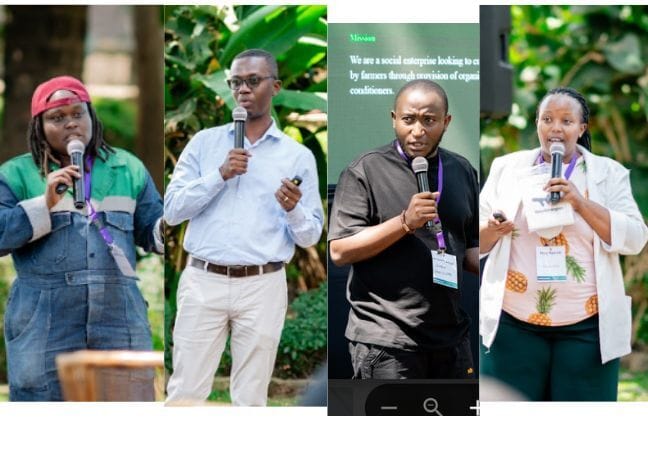- Circular Rising
- Posts
- Circular innovations gain ground as startups reimagine waste
Circular innovations gain ground as startups reimagine waste

From the newsletter
Africa’s circular economy sector is largely dominated by startups, with entrepreneurs transforming waste into opportunity. At the recent Delta40 Bestseller Foundation Circular Economy Scale Summit in Nairobi, several entrepreneurs showcased how Africa’s waste can be turned into scalable solutions.
We feature four innovations that reimagine waste streams as valuable assets for construction, farming, consumer goods and technology.
The ventures have been part of the 6-month Delta40 x Bestseller Foundation Circular Economy Innovation Program, designed to accelerate breakthrough circular economy solutions across Africa.
More details
Gjenge Makers has pioneered a model that transforms plastic waste into durable, affordable building materials. The start-up compresses waste plastics into strong pavers and bricks that not only help clean up plastic pollution but also provide a low-cost solution for the construction sector. According to the founder, Nzambi Matee, the social enterprise started in 2017 has to date recycled 300,000 kilograms of plastic, created 250 jobs and sold over 500,000 products.
While Gjenge reimagines plastics, Deed Technologies is addressing another mounting problem, electronic waste. The company is working to establish Kenya’s first circular IT centre, focused on refurbishing end-of-life computers locally rather than depending on imports. With 80 percent of computers in Kenya already refurbished, founder Edwin Wagura says that more of this value should be captured within the region.
For Mr Wagura, changing perceptions is just as important as building infrastructure. “Our hope is that in 10 years, refurbished will not be associated with poor quality, but with affordability and good quality,” he told Circular Rising in an interview, describing the company’s mission to normalise refurbished technology as a reliable and sustainable choice.
Eco Biofertiliser is applying circular principles to agriculture. The social enterprise provides cost-effective soil conditioners from recycled bio-waste, tackling soil degradation, food insecurity and Nairobi’s mounting biowaste challenge. “We save farmers around 60% of the cost because our bags go for around $19 compared to the market rate of $42 to $45 per 50 kg bag. We are also certified by the Kenya Bureau of Standards (KEBS) and the Kenya Plant Health Inspectorate Service (KEPHIS),” company co-founder and Circular Lead, Anthony Migwi, told Circular Rising in an interview.
Meanwhile, Mary Nyaruai of Nyungu Afrika is rethinking menstrual health products with a model that touches on environmental impact. Her company is making sanitary pads from underutilised agricultural by-products like pineapple leaves and maize husks, designed to be biodegradable and affordable.
These innovators are keen on scaling their solutions, but funding remains a challenge. In a pitch to investors at the Delta40 Bestseller Foundation Circular Economy Summit in Nairobi, the entrepreneurs made a case for their innovations. Deed Technologies is seeking $1.07 million to scale its operations. The funds will be used for infrastructure, marketing, expansion and operations.
Gjenge Makers is seeking $580,876 in funding. Founder Ms Matee says the capital will be directed towards equipment and infrastructure, operations, technology, R&D and sales. With the funding, she hopes her initiative will help address a significant portion of the 92% of plastic waste that ends up in landfills in Kenya.
For Nyungu Afrika, $250,000 is what stands between them and realising their desire of offering sanitary towels that are affordable and sustainable. According to Ms Nyaruai, the funding will help the enterprise pilot its products, which have already been tested in the UK, Germany and India.”Investing in this company is the right thing to do. It makes business sense, but it is also about humanity, it shows that you care,” she appealed to investors in an interview with Circular Rising.
“We are doing a fundraising phase one of about $200,000. This is structured for machinery acquisition, to scale our production from the 100 bags we are doing per day to about 300 bags per day. The other requirement is around working capital. So we are inviting open bids for working capital,” Eco Biofertiliser co-founder Mr Migwi told Circular Rising.
Our take
The journeys of these startups demonstrate both the ingenuity driving Africa’s circular economy and the structural gaps that still hinder scale.
With the right mix of investment and partnerships, and supportive policies, their solutions could move from isolated ventures to transformative forces shaping how the continent manages waste and resources.
More platforms like the Delta40 Summit are needed to connect innovators with patient capital, foster meaningful partnerships, build trust and accelerate Africa’s transition towards a thriving circular economy.